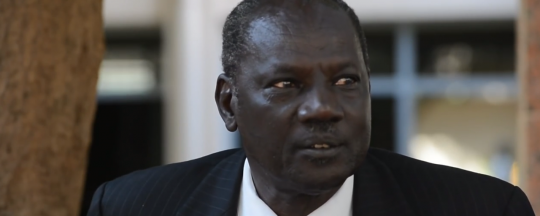Loyalists of President Salva Kiir have sought to resolve confusion over the status of the National Security Service Act of 2014 by declaring it to be law, in spite of challenges last year that the bill never passed parliament with quorum owing to a walkout by the Equatorian Caucus.
The bill aims to transform the National Security Service from an information-gathering body to a secret police service with powers of warrantless arrest, detention, search and seizure.
A copy of a letter from the Justice Minister to the National Security Minister, dated 25 February but obtained by Radio Tamazuj only today, announces that the bill “has become an operational law.”
When the bill was voted on 8 October 2014, the ruling party caucus was deeply split along ethnic lines, with Dinka MPs supporting the motion while Equatorian MPs mostly boycotted the vote.
A group of Equatorian MPs walked out of the assembly hall before the bill was voted unanimously as an oral motion. Afterwards the clerk of the assembly failed to produce a written record of attendance to prove a quorum.
“All the Greater Equatoria is not in the house. They are not in the house,” MP Deborah Ajok Garang was quoted as saying during the final debate. She was one of two female MPs, both Dinkas, who cautioned against passing the bill without the support of the Equatorian caucus.
A group of MPs led in part by Henry Odwar, an Equatorian parliamentarian from Ikotos who has since gone into exile, declared that the bill had failed to pass quorum. On the other side, the Speaker of the Assembly Manasseh Magok claimed a quorum had been reached.
No significant legislation has passed parliament since the October 2014 split.
Presidential Press Secretary Ateny Wek made a face-saving announcement in November 2014 arguing that the bill had never been defeated in parliament but nonetheless would not become law because the president had objections to it.
However, the formal announcement that the president withheld his assent was not made until mid-December, when he cited certain minor concerns with the bill and recommended minor changes.
Differing tactics
Kiir’s loyalists appear to have differed over how to handle the issue without either admitting to a legislative defeat or further alienating the Equatorian Caucus. In his November press conference, Ateny Wek hinted that parliament would deliberate the bill again. But the Speaker of the Assembly apparently resisted this approach, according to the justice minister’s letter today.
The letter reveals that the Speaker insisted not only that the bill was passed but also that Kiir’s nominal objections to the bill could not be considered because they had come too late.
Justice Minister Paulino Wanawilla’s letter explains, “Article 85(1) of the Transitional Constitution, 2011, provides that a bill becomes law when the President assents to it by signature or withholds such assent for thirty days without giving reasons, whereby the bill has to be deemed to be signed.”
“In his letter of 22nd December, 2014 (with copy to me), the Rt. Hon. Speaker of the National Legislature has advised that since the National Security Service bill had delayed for 33 days in the Office of H.E. the President before being returned to the National Legislature with observations, it is therefore deemed to have been signed.”
Given these differing views, the Justice Minister determined that he should declare the bill to be law while also noting, “The observations of the President will be initiated as amendment to this law.”
‘Return to lawlessness’
In an interview with Radio Tamazuj today, Minority Leader Onyoti Adigo slammed the Justice Minister’s move saying the security bill is unconstitutional and became law by “manipulation” and intimidation.
“We as citizens of South Sudan are saying this law is not good because it violates the constitution of the Republic of South Sudan, because it makes the National Security personnel as part of the law enforcement agents,” he said, explaining that the bill gives unconstitutional powers of arrest.
Recalling a time when summary executions and secret detentions were practiced, he said, “We are now returning to lawlessness. Because if the security people take you, where will they take you? We are returning to the time when the security people of Khartoum could take people and put them in ‘ghost houses.’ We are supposed to have police and prisons.”
“We are saying that this law is not good and it has to be returned so that people discuss it.”
File photo: Information Minister Michael Makuei
Related coverage:
Kiir ‘returns’ his own security bill to parliament 69 days after controversial vote
Factbox: ‘Quorum’ in South Sudan’s constitution and politics (29 Nov.)
Kiir to try again to pass his security bill (27 Nov.)
Photos: S Sudan assembly largely empty during security vote (9 Oct.)
Hundreds of MPs absent during vote on Kiir’s security bill (8 Oct.)
South Sudan MPs fail to show up for vote on Kiir loyalty oath (7 Oct.)
Bill requires South Sudan secret police to swear obedience (6 Oct.)




